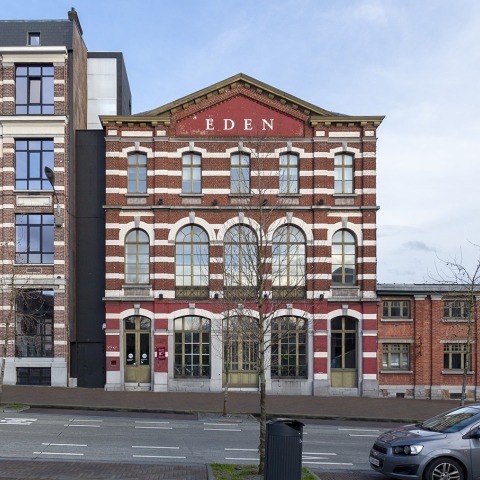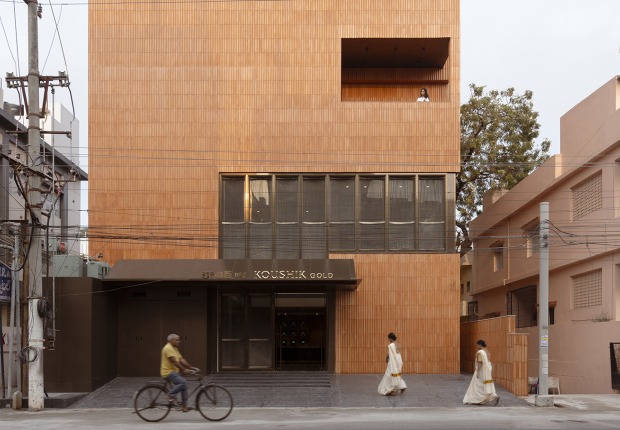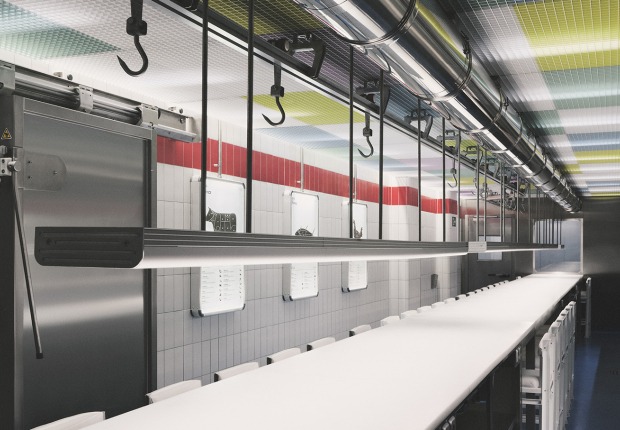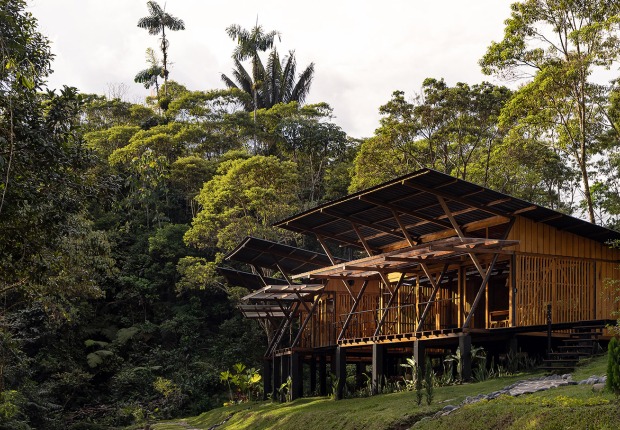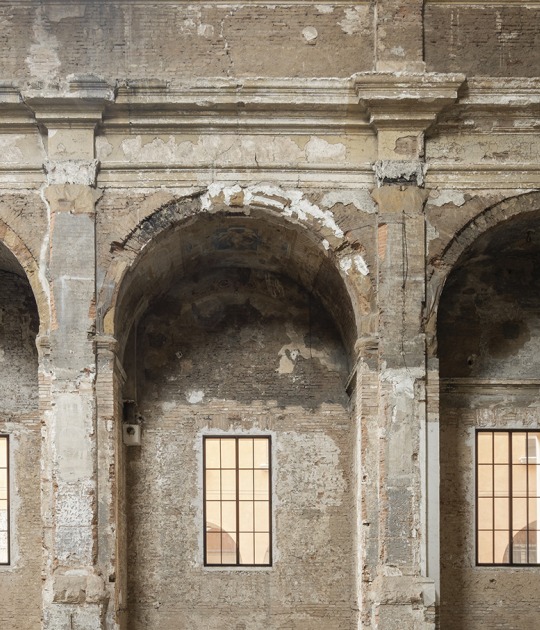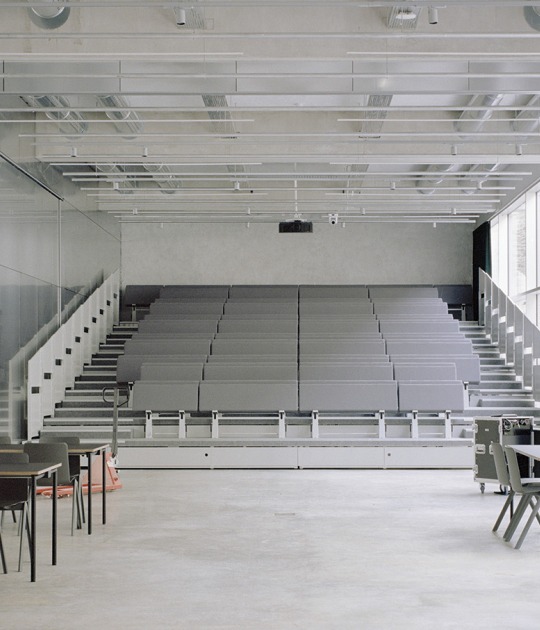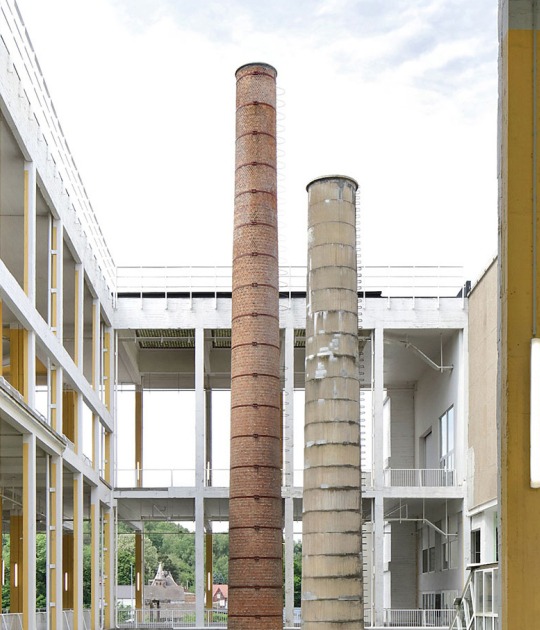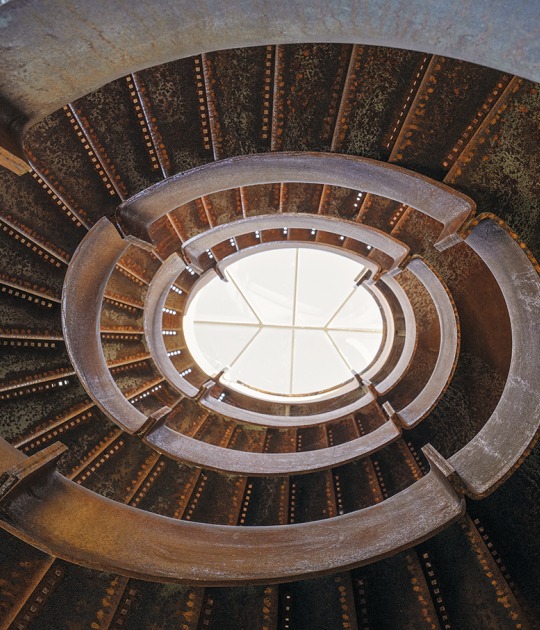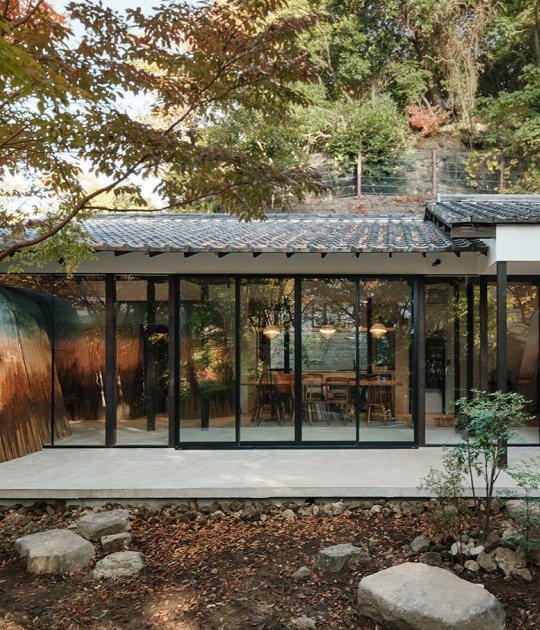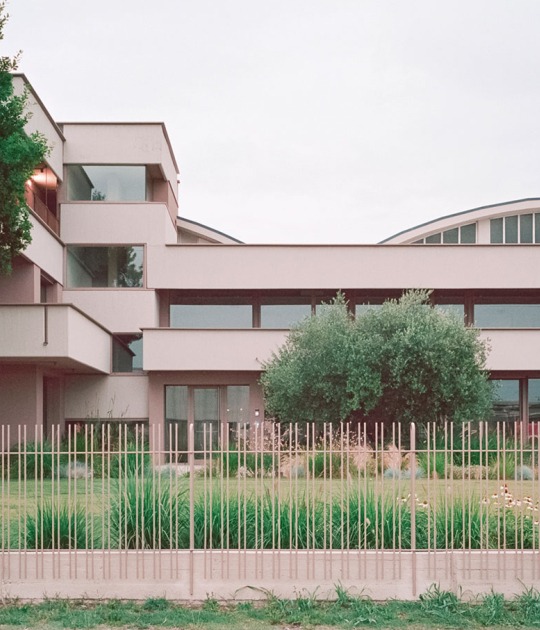
The project developed by RESERVOIR A involves different interventions in the centre's satellite spaces, offering a new spatial distribution around the existing performance hall at the Regional Cultural Centre. Through a series of demolitions and modifications, internal circulation is facilitated, as well as enhancing connections with the city, to build and strengthen social ties.
The project is based on the traces left by the passage of time, such as the imperfections and original characteristics of the existing structures, with the intention of transcending and encouraging the reuse of the building instead of a future demolition. The treatment of the materials, their colours and textures play an important role, helping to bring the history and identity of the building closer to its visitors.

Eden: Artistic Creation Center by RESERVOIR A. Photograph by Marie-Noëlle Dailly.
Project description by RESERVOIR A
Selected by the new management of the Eden in 2012, RESERVOIR A offers a non-ostentatious architecture that pursues the objective of opening up all possibilities to this cultural tool.
The renewal of the cultural project is supported by flexible spaces, which have regained their former proportions, and asserts a new identity on the public square. A project carried out by the architects of RESERVOIR A and the landscapers of Carbonifère.
An Ambitious Redefinition
The transformation and expansion program of the Eden has been realized in several successive phases since 2012. The designers took charge of the renovation and the necessary energy compliance, to develop a tool that meets the challenges launched by its director, Fabrice Laurent.
"Eden defines itself as a place of diversity and crossbreeding, a space of expression for the entire Pays Noir, an undisciplined cultural project open to all, and to all forms of culture within and outside the walls! Eden, Charleroi, Paradise, it's here!".
Fabrice Laurent, director de Eden Charleroi.

The change of vision is accompanied by a subtle modification of the spaces so that they can adapt to the multifaceted uses of the cultural project.
"Unlike a theater, a concert hall, an art gallery or a cinema, the programming of a cultural center cannot be limited to a single field of action. Its multiple activities must balance between the artistic and the sociocultural, diversify the aesthetics between classical and contemporary forms, with the aim of reaching a maximum of audiences."
Fabrice Laurent, director de Eden Charleroi.
The Regional Cultural Center had a large performance hall. This nerve center has not been modified, unlike the satellite spaces that have been modernized, with careful and necessary attention to the spatial layout. The range of places has gradually expanded, to multiply their possible appropriations and to accommodate the best of theatrical, lyrical, choreographic, circus or musical creation.
The Brasserie, a Place for Everyday Life
During a first phase of intervention in 2012, RESERVOIR A changed the face of the spaces located on the ground floor: the reception and the large brasserie. The building that houses the brasserie dates from the end of the 19th century and was transformed on multiple occasions, notably in the 1990s by the architectural firm Lhoas & Lhoas. The use of the space has been modified, by creating permeability, between the access area and the brasserie room, thanks to large core samples. These openings through the wall complete the stripping down of the rest of the space. The room was cluttered by acoustic elements on the ceiling, hiding the elegant capitals of the cast iron columns.
The room thus regains its original spatial proportions and displays a new visual identity brought by the use of color and the bar itself. The strong contrast between black and white allows the highlighting of any other color, used during ephemeral projects. This allows to clearly emphasize these projects. The bar furniture, designed by the architects, occupies the entire length of the room. It is made of concrete, formwork and cast on site. Despite its 17 tons, it is soberly deployed in the place thanks to the relief given by a series of folds in the concrete.

Le Cinq, An Informal Space
The acquisition in 2018 of the building located at n°5 boulevard J. Bertrand, called “Le Cinq”, is a godsend. A series of demolitions and modifications will streamline traffic flow between the buildings and their floors (phase 2). On the ground floor, a first space is designed as a third place – a place to live, meet, share practices and experiences. It is open to the neighborhood and the city, during the day and in the evening, to build and strengthen social ties. It receives a main multipurpose piece of furniture, made of black lacquered sheet metal and composed of folds, echoing that of the brasserie.
The removal of the sills radically changes the perception of the place by reinforcing the continuity of the third place on the boulevard. Inside, the use of a large curtain easily subdivides the room. This choice echoes previous interventions by RESERVOIR A, at the Maison de la Laïcité in particular. Multipurpose workshop spaces for the carnival or for use by different associations, storage areas and a rehearsal room – the Bocal – occupy the two upper floors. The third floor and the attic have become the place for artists in residence.
1, 3, 5: Connected Spaces
Once again, the interventions are targeted and color plays a major role in the unity created. From the current entrance located at n°1 of the Boulevard, the demolition and transformation of the staircase as well as the large openings, allow for direct visual contact with n°3 and Cinq. The injunctions and modifications of the existing staircases are assumed by the materiality of the wood painted black.
The large emergency staircase, located between n°3 and Cinq, which was open to the open air, is now closed by a light steel and polycarbonate structure. It becomes the central column of circulation between the floors of the different buildings of the Eden. The space is intelligently completed with a freight elevator under the first flight, thus serving the ground floor, the basement of Cinq and n°3, in order to facilitate the handling of technical equipment to the room.

Energy Renovation
The energy renovation constitutes phase 3 of the overall project. It provides additional comfort to staff and users, while reducing energy losses. For the stairwell, the choice of polycarbonate filters natural light during the day and artificial light at night. The gables and the rear façade are covered with raw cork panels: a renewable resource, an entirely natural and recyclable material, which can even accommodate a certain biodiversity in its interstices. Finally, the renewal of the frames and the roof completes the work on the envelope.
Jardin D’eden
At the intersection of the buildings, an interior block courtyard has been created. In 2018, Eden called on Carbonifère to plant this courtyard, which was quickly named the Jardin d’Eden. From Le Cinq, a few steps are necessary to access it. The architects transformed the first of the steps into a wide landing for a potential small stage open to the outside. In this project, everything is thought of as a potential support for the diversity of cultural expressions.
Interior Materiality: A Pre-Existing Identity Preserved
The treatment of materials and textures celebrates the history and identity of the pre-existing building, favoring creative reuse rather than demolition or heavy transformation. This aesthetic values the traces of time, imperfections and original characteristics of existing structures: cracked coatings, erased paint, traces of past interventions (repairs, dismantling, deliberate or involuntary damage, etc.).
This work highlights the intrinsic beauty of what is already there, seeking to create spaces that transcend the simple functional aspect, to become living testimonies of the evolution of places, in a deep respect for the surrounding context.
